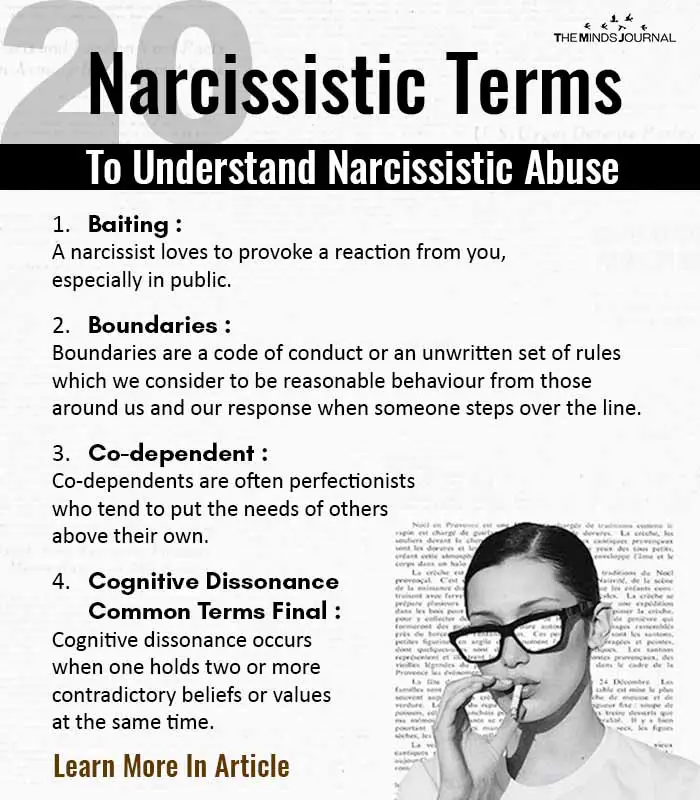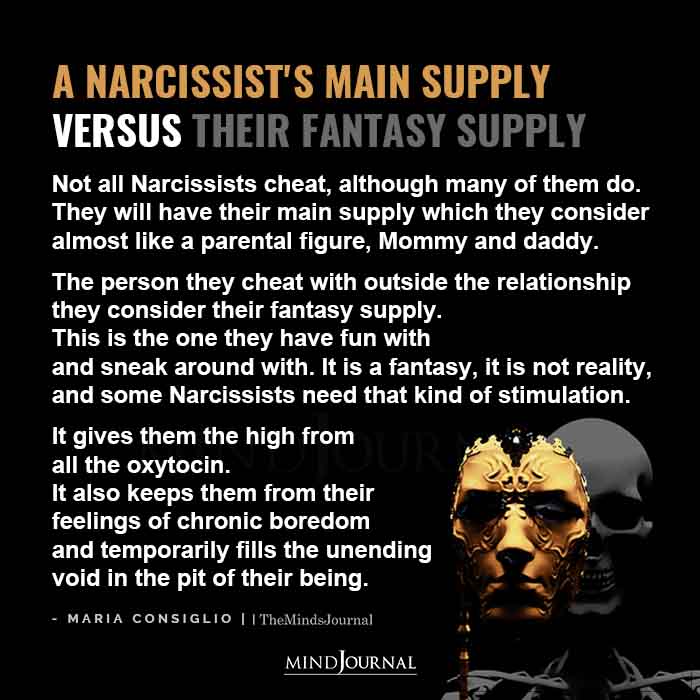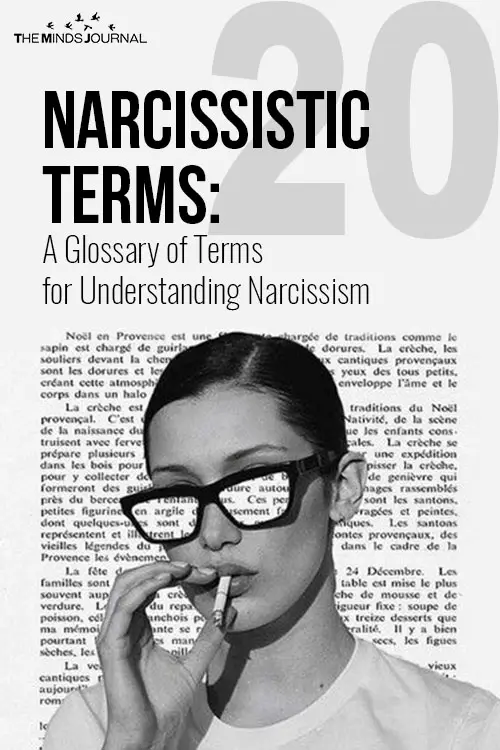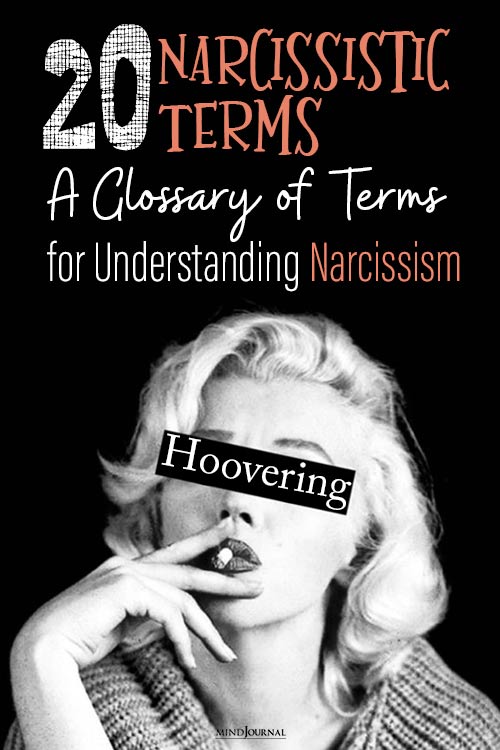When it comes to narcissists and narcissism, do you know all the narcissistic terms associated with it? This article discusses in detail all the narcissistic words and phrases that will help you understand this condition better.
20 Narcissistic Terms You Should Know About: Guide To Understanding Narcissism

1. Baiting
A narcissist loves to provoke a reaction from you, especially in public. They will provoke you into responding in an angry or emotional manner (Your angry response is further evidence of your unbalanced state of mind).
Related: Narcissism Terms: 7 Clever Slang Terms For Discussing Narcissism
2. Boundaries
Boundaries are a code of conduct or an unwritten set of rules which we consider to be reasonable behaviour from those around us and our response when someone steps over the line.
3. Co-dependent
The individual characteristics vary from person to person. Some of the more common characteristics would include trying to avoid making decisions and preferring to rely on others. Co-dependents are often perfectionists who tend to put the needs of others above their own.

4. Cognitive Dissonance
Cognitive dissonance occurs when one holds two or more contradictory beliefs or values at the same time. Sometimes people hold very strong beliefs and when they are presented with evidence which opposes those beliefs, they find it impossible to accept evidence to the contrary.
Dissonance is often strong when we go against our own moral standards, for example, if someone believes that they are a good person and goes ahead and does something wrong or bad, the feelings of guilt and discomfort are known as cognitive dissonance.
5. Enabler
An enabler is someone who by their action or inaction, they encourage or enable a pattern of behaviour to continue or remove consequences of bad behaviour.
6. Flying Monkeys
Flying monkeys are people who have been convinced by the narcissist that he or she is the real victim. They inflict further harm on the real victim by submitting to the narcissist’s wishes and demands. They may threaten, torment, discredit or add fuel to a smear campaign by spreading lies and gossip.
Related: How Flying Monkeys Help a Narcissist And How You Can Save Yourself
7. Gas-lighting
Gas-lighting is a manipulative tactic where a mentally healthy individual is subjected to conditioning behaviour so that they doubt their own sanity. The target starts to believe that their perception of reality is false.
The narcissist may simply deny saying something didn’t happen when it did, tell you that you heard wrong or lie about an event or situation. Over time a victim starts to think they are confused and going crazy. They come to rely more and more on the narcissist to keep them right.
8. Grey Rock
Grey rock is a term used to describe your behaviour when trying to cut contact with a narcissist. The aim is to be utterly boring so that the narcissist no longer sees you as a good supply and subsequently disappears.
9. Hoovering
The term, hoovering, is derived from the Hoover vacuum cleaner which describes how a narcissist attempts to suck their victims back into a relationship. They will use every trick in the book to get you back under their power and control.
Hoovering often takes place after you have left them or after a period of silent treatment. They often promise to change their behaviour or say that they have already changed dramatically.
Related: 8 Signs You Are The Victim Of An Abusive “Hoovering” Narcissist
10. Invalidation
Invalidation is a manipulative tactic used to get a target to believe that their thoughts, opinions and beliefs are wrong, unimportant or don’t matter.
11. Love Bombing
Love bombing is a term used to describe the typical initial stages of a relationship with a narcissistic personality where the narcissist goes all out to impress their target with flattery, holidays, promises of a future together having the target believe that they have met their perfect partner, their soulmate.
12. Mirroring
A narcissist will mirror what they see in you from your mannerisms to your dress sense, your behaviour and your likes and dislikes. They basically become just like you.
13. Narcissistic Supply
A narcissist is lost without narcissistic supply. They need supply like a plant needs water. Narcissistic Supply consists of attention, admiration, respect, adulation and even fear. Without these vital nutrients of life, the narcissist will become dysfunctional.

14. No Contact
No contact is put in place by a victim in order to give them time to recover. It is not in any way similar to the narcissist’s silent treatment. A narcissist who initiates the silent treatment is doing so as a punishment and to exert power and control.
No contact is a self-imposed set of rules whereby there will be absolutely no contact with the toxic person, (No texts, no emails, no phone calls, no snooping on social media). It has been likened to building a wall between you and a toxic individual. You will not care or even be aware of what happens on the other side of this wall. (Minimal contact is advised in circumstances where one has to co-parent with a narcissist).
15. Projection
A narcissist is an expert at projecting their own character flaws or bad behaviour onto others. They will not hold themselves accountable for any wrongdoing and will blame others for the very things that they do themselves. The main objective is to make themselves feel superior.
Related: Glossary Of Narcissistic Terms: Terms That Describe Narcissistic Behaviors
16. Scapegoat
The scapegoat is blamed for just about everything that goes wrong. A child in a family may be singled out and subjected to unwarranted negative treatment.
17. Trauma Bonding
This term comes from a real-life hostage situation where a number of hostages became emotionally attached to their kidnappers, (The Stockholm Syndrome).
Trauma bonding is a misplaced loyalty where a victim is emotionally bonded with their abuser and finds themselves unable to leave an unhealthy or dangerous relationship. The victim remains loyal to someone who has betrayed them time and time again.
18. Self Esteem
Self-esteem is the overall judgement one holds about their own self-worth which would include pride in oneself, self-respect and self-assurance.
19. Triangulation
Narcissists thrive on chaos. They provoke rivalry and jealousy between people, creating triangles in order to boost their own ego.
20. Closure
Closure in a normal relationship involves open and honest communication about what has gone wrong, you wish each other well, say goodbye and move on. After a relationship with a narcissist ends a target is left with so many questions and no answers.
Related: What is a Narcissist? A Primer for the Lay Person on Narcissism
It feels like the book has been closed before the story has ended. We cannot expect any form of closure from the emotionally immature narcissist who is completely lacking in empathy with no regard for your feelings. The only closure in this type of relationship is the closure you give yourself.
Written by Anne McCrea
Originally appeared in Narcisist And Emotional Abuse
Printed here with prior permission











Responses
4.5